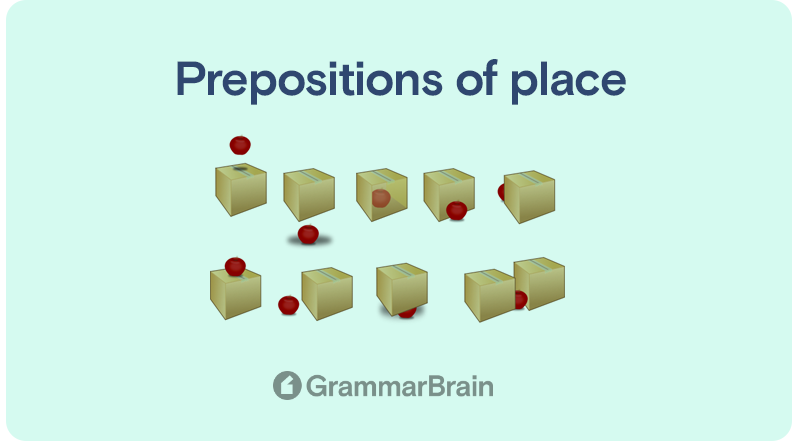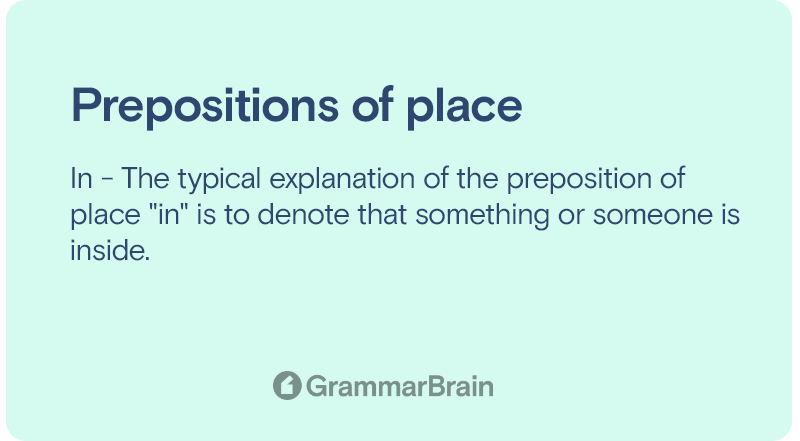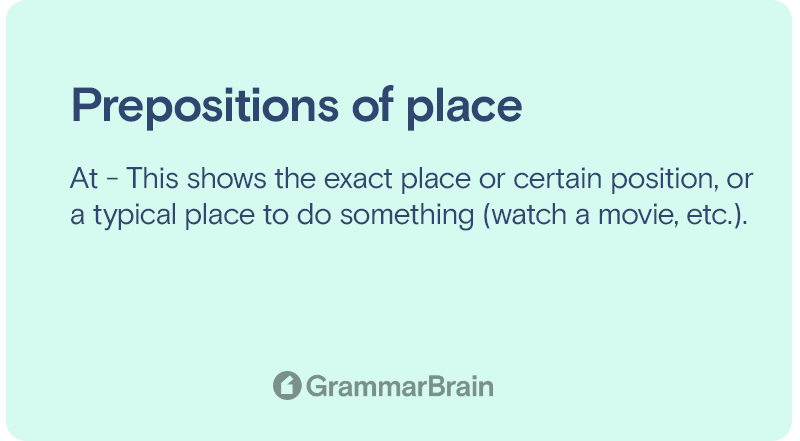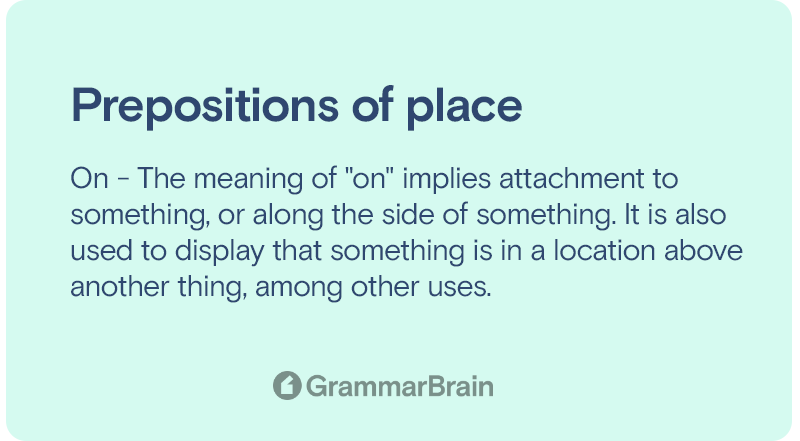What is a preposition of place? Prepositions are words in English grammar and fall within a class of words to use temporal or spatial relations to other words (like nouns). As a result, prepositions combine with noun phrases. Prepositions also play a range of semantic roles in English speech and writing.

Understanding preposition of place
Preposition of place in English grammar is a preposition that refers to a place or a location at which something takes place. It also refers to any place at which someone or something is located.
In English, preposition of place plays a key role in informing others about the location of an individual or a thing.
In fact, place prepositions are important as they convey information about a location in relation to a thing or another individual.

What are the prepositions of place?
There are many words and phrases that fall within the category of “preposition of place” in English. Each serves distinctive purposes while speaking and writing. The key place prepositions are mentioned below:
- At
- In
- On
- Under
- Over
- Above
- Below
- Beside
- In front of
- Behind

The use of the preposition of place
The preposition of place can help to convey the exact location of something or someone. Place prepositions typically answer the question, “Where?”
For example, the answer to “Where is my shoe?” may be “Under the bed”. Besides the prepositions of place listed in the former section, the words “between”, “beneath”, “next to”, etc. are also considered prepositions.
Furthermore, the words “across” and “opposite” which tell you about locations are prepositions of place as well.

Main prepositions of place with examples
Below, the place prepositions are mentioned in greater detail, along with examples of how they occur in sentences. With the examples mentioned, a good idea of the use of any preposition of place might be grasped:
- At – This shows the exact place or certain position, or a typical place to do something (watch a movie, etc.).
I met her at the entrance to the theater.
There is a large crowd at the bus stop this evening.
At university, we have a lot of fun.
- In – The typical explanation of the preposition of place “in” is to denote that something or someone is inside.
Usually, I watch television in the living room.
Susan looks in the mirror all day.
Have a look at the boy in the picture.
In England, it snows in January.
- On – The meaning of “on” implies attachment to something, or along the side of something. It is also used to display that something is in a location above another thing, among other uses.
The picture on the wall is creepy.
Cambridge is located on the River Cam.
The novel is on the table.
My house is on the right corner.
They love to travel on planes and are often on holiday.
Her favorite television programs are all detective shows.
Conclusion
Prepositions of place occur (usually) in front of the noun they qualify. For example, “behind the house”, “near” the school, “by” the window, etc. Nonetheless, depending on what is said or written, they may occur at the end of a sentence as well.
For instance, “The chair that you sat on was wet,”, or “Look at the clothes you are in!”. Prepositions can also occur at the beginning of sentences, such as “On the table, near the bench, you will find the torch”.
Unfortunately, regardless of the preposition of place, any preposition has very few rules that educate others about their purpose, and consequently, their use.
Using prepositions can be tricky, and there are several denoting a particular place. Nonetheless, using a good dictionary and finding out more through regular reading helps.
FAQs
1. What is a preposition of place?
A preposition of place indicates a word that shows the position or location of something or someone. These include, but are not limited to, at, on, in, besides, in front of, behind, above, below, etc.
2. What are the most used prepositions in the English language?
The most commonly used prepositions used in English are at, in, and on. Other prepositions in use are under, above, below, near, close to, etc.
Sources:
- Prepositions of place | LearnEnglish Kids (britishcouncil.org)
- Preposition Examples and How to Use Them | Grammarly
- Prepositions – Grammar – Cambridge Dictionary
- Preposition Definition & Meaning – Merriam-Webster
Inside this article
Fact checked:
Content is rigorously reviewed by a team of qualified and experienced fact checkers. Fact checkers review articles for factual accuracy, relevance, and timeliness. Learn more.
Core lessons
Glossary
- Abstract Noun
- Accusative Case
- Anecdote
- Antonym
- Active Sentence
- Adverb
- Adjective
- Allegory
- Alliteration
- Adjective Clause
- Adjective Phrase
- Ampersand
- Anastrophe
- Adverbial Clause
- Appositive Phrase
- Clause
- Compound Adjective
- Complex Sentence
- Compound Words
- Compound Predicate
- Common Noun
- Comparative Adjective
- Comparative and Superlative
- Compound Noun
- Compound Subject
- Compound Sentence
- Copular Verb
- Collective Noun
- Colloquialism
- Conciseness
- Consonance
- Conditional
- Concrete Noun
- Conjunction
- Conjugation
- Conditional Sentence
- Comma Splice
- Correlative Conjunction
- Coordinating Conjunction
- Coordinate Adjective
- Cumulative Adjective
- Dative Case
- Determiner
- Declarative Sentence
- Declarative Statement
- Direct Object Pronoun
- Direct Object
- Diction
- Diphthong
- Dangling Modifier
- Demonstrative Pronoun
- Demonstrative Adjective
- Direct Characterization
- Definite Article
- Doublespeak
- False Dilemma Fallacy
- Future Perfect Progressive
- Future Simple
- Future Perfect Continuous
- Future Perfect
- First Conditional
- Irregular Adjective
- Irregular Verb
- Imperative Sentence
- Indefinite Article
- Intransitive Verb
- Introductory Phrase
- Indefinite Pronoun
- Indirect Characterization
- Interrogative Sentence
- Intensive Pronoun
- Inanimate Object
- Indefinite Tense
- Infinitive Phrase
- Interjection
- Intensifier
- Infinitive
- Indicative Mood
- Participle
- Parallelism
- Prepositional Phrase
- Past Simple Tense
- Past Continuous Tense
- Past Perfect Tense
- Past Progressive Tense
- Present Simple Tense
- Present Perfect Tense
- Personal Pronoun
- Personification
- Persuasive Writing
- Parallel Structure
- Phrasal Verb
- Predicate Adjective
- Predicate Nominative
- Phonetic Language
- Plural Noun
- Punctuation
- Punctuation Marks
- Preposition
- Preposition of Place
- Parts of Speech
- Possessive Adjective
- Possessive Determiner
- Possessive Case
- Possessive Noun
- Proper Adjective
- Proper Noun
- Present Participle
- Prefix
- Predicate



